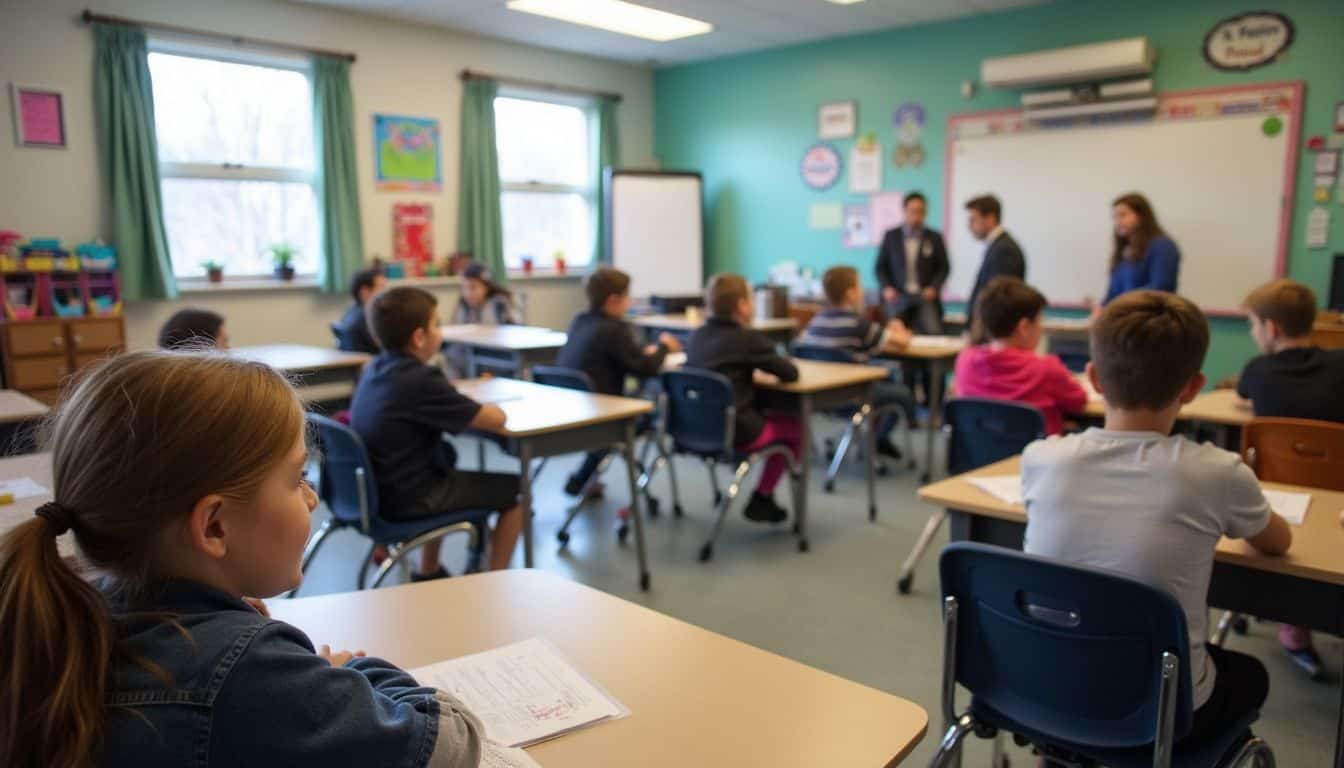Many women want to help children with special needs but don’t know how to become special education teachers. Special education teachers work with students who have learning disabilities, physical disabilities, and emotional disorders across all grade levels.
This guide breaks down 7 clear steps to start your career in special education, from earning your bachelor’s degree to gaining teaching certification. Get ready to transform lives through inclusive education.
Key Takeaways
Special education teachers need a bachelor’s degree, state certification, student teaching experience, and must pass exams like Praxis assessments.
Teachers create individualized education programs (IEPs) for students with learning disabilities, emotional disabilities, physical disabilities, and developmental delays.
Job outlook shows 1% decline from 2024-2034, but 37,800 annual openings exist due to retirements and career changes.
Master’s degrees lead to higher salaries and specialized roles, with online programs costing $4,125 per term over 22 months.
Essential skills include strong communication, patience, classroom management, and knowledge of assistive technology for diverse student needs.
Table of Contents
What does a special education teacher do?

Special education teachers assess student skills and needs to create personalized learning plans. These educators develop and update individualized education programs (IEPs) for students with learning disabilities, developmental delays, and other special needs.
Teachers adapt general lesson plans to match each student’s learning style and abilities. They work with students who have physical disabilities, emotional disabilities, cognitive impairments, and autism spectrum disorders.
These instructors collaborate with occupational therapists, speech therapists, and school counselors to set academic and behavioral goals. Special education teachers implement teaching methods that support students with sensory processing disorders, language delays, and developmental disorders.
They supervise classroom assistants and communicate regularly with parents about student progress. Teachers use assistive technology like Braille writers and communication software to help students with sensory disabilities.
Their work environments include resource centers for small group instruction, inclusive classrooms with general educators, and specialized programs that teach life skills to students with severe disabilities until age 21.
Digital Praxis 5354 Exam Prep Guide helps prepare educators for certification requirements.
Qualifications needed to become a special education teacher

Special education teachers need specific education and training to work with students who have learning disabilities, developmental delays, and other special needs. You must complete a bachelor’s degree, earn teaching credentials, and gain hands-on experience through student teaching programs.
What educational requirements are needed?

A bachelor’s degree in special education or a related field serves as the foundation for public school teachers. Some states require the bachelor’s degree to be specifically in special education, while others accept degrees in liberal studies, early childhood education, or child development.
Private schools usually require a bachelor’s degree but don’t always demand state licensure.
Education is the most powerful weapon which you can use to change the world. – Nelson Mandela
Alternative pathways exist for those with bachelor’s degrees in other fields. These individuals can obtain special education credentials through certificate programs or master’s degree programs.
Some states require teachers to earn a master’s degree after being hired to achieve full certification. Entry-level positions consistently require at least a bachelor’s degree, making this the minimum educational standard across all teaching environments.
The specific licensing requirements vary by state and school type.
What licenses and certifications are required?

State certification or licensure is mandatory for all public school special education teachers. You must earn a bachelor’s degree with a minimum GPA to qualify for teaching credentials.
Student teaching completion serves as a required component of your certification process. Background checks are mandatory before states issue teaching licenses.
Candidates must pass teaching certification tests and subject knowledge exams like Praxis assessments. Many states require continuing education for license renewal every few years.
Alternative certification programs exist for women with bachelor’s degrees in other fields, often leading to master’s degree requirements. Private schools may not require state licensure but typically demand bachelor’s degrees from applicants.
What on-the-job training is typical?

New special education teachers receive comprehensive on-the-job training after employment to develop job competence. Professional development programs and mentorship opportunities support new hires through their first year.
Training includes modeling techniques, performance feedback, and field-based opportunities that help teachers apply classroom management strategies with students with disabilities.
Induction programs in states like California provide structured support and mentorship for beginning teachers. Training covers assistive technology use, adaptive teaching methods, and individualized education programs (IEPs) development.
Teachers learn applied behavior analysis techniques and specialized approaches for learners with developmental delays, learning disabilities, and emotional disabilities. Full certification often requires completing a master’s degree after initial employment, while continuing education maintains licensure and keeps teachers current with best practices in special needs education.
Steps to becoming a special education teacher

Becoming a special education teacher requires four key steps that will prepare you to work with students who have learning disabilities, developmental delays, and other special needs.
You’ll need to earn your bachelor’s degree, complete teacher training programs, get your state license, and gain hands-on classroom experience with individualized education programs.
These steps build the foundation for working with people with disabilities across preschool through high school settings. Read on to discover exactly what each step involves and how to fast-track your career in special education.
How do you earn a relevant bachelor’s degree?

Most special education teachers earn a bachelor’s degree in education or special education. Online bachelor’s programs in special education offer flexibility for busy women. These programs cost about $3,825 per 6-month term.
Students complete 38-39 courses over 34-38 months. About 61% of students finish within this timeframe.
Coursework covers lesson planning, ethics, behavioral support, and child development. Students learn classroom management techniques and teaching methods for individuals with disabilities.
Programs include psychology courses and study skills training. Degree programs require observation hours in real classrooms. Students complete a full-time student teaching internship before graduation.
Bachelor’s options include a BA in Early Childhood Education or a BA in Liberal Studies with a Multiple Subject Credential. Some programs offer dual degrees in elementary and special education.
People with non-teaching bachelor’s degrees can pursue online master’s programs for initial licensure.
State requirements vary for special education teacher training programs.
What is involved in a teacher preparation program?

Teacher preparation programs combine classroom coursework with hands-on teaching experience. Students learn about special education law, curriculum modification, and various learning environments that serve children with learning disabilities and developmental delays.
Programs teach future educators how to create individualized education programs (IEPs) and adapt lesson plans for students with physical disabilities and emotional disabilities. Coursework covers child development, teaching methods, and classroom management strategies essential for working with diverse learners.
Supervised student teaching internships last a full semester in actual special education classrooms. Clinical teaching experiences give students practical skills in individualized instruction and communication skills needed for this field.
Programs require students to pass state exams and complete background checks for eligibility. Accredited programs prepare teachers to use assistive technology and develop effective learning environments for students from kindergarten through junior high levels.
State licensure or certification comes next after completing these comprehensive preparation requirements.
How do you obtain state licensure or certification?

Candidates must hold a bachelor’s degree and complete a teacher preparation program to obtain state licensure. Most states require passing specialized exams that test knowledge of special education programs and teaching methods.
Background checks and fingerprinting are standard requirements across all states for special education teacher certification.
California requires candidates to pass the CBEST or CSET exams and complete an Education Specialist Credential program. Students must also pass the Teaching Performance Assessment (TPA) and receive a recommendation from their program sponsor.
After earning a Preliminary Credential, teachers complete an induction program and additional professional development to earn their Clear Credential. States typically require credential renewal every five years with ongoing professional development hours.
Teachers seeking specializations in areas like autism spectrum disorder or early childhood education need additional authorizations beyond basic certification.
How can you gain classroom experience?

After you secure state certification, you need real classroom experience to succeed as a special education teacher. Completion of a student teaching internship in a special education classroom is required for licensure in all states.
Substitute teaching offers excellent hands-on practice with students who have learning disabilities, emotional disabilities, and physical disabilities. Many schools need substitute teachers who can work with individualized education programs (IEPs) and understand teaching methods for developmental delays.
Internships provide practical classroom experience in resource rooms, inclusive classrooms, or self-contained settings. Pre-service experiences, including credentials, degrees, and student teaching placements, influence job readiness directly.
Field-based training and hands-on strategies are emphasized in special education preparation programs across the country. Teachers should seek opportunities to work with cooperating teachers who are endorsed in special education to learn classroom management techniques.
Practicum experiences can include work with occupational therapy teams and speech therapy specialists. Dual endorsements in elementary and special education can expand classroom experience options significantly.
Quality and extent of preparation programs impact effectiveness and career retention for special education teachers.
What skills are essential for special education teachers?

Special education teachers need specific skills to help students with learning disabilities, emotional disabilities, and developmental delays succeed. Strong communication skills and classroom management abilities form the foundation for creating effective individualized education programs that meet each child’s unique needs.
How important are communication and interpersonal skills?

Communication skills form the backbone of special education teaching. Teachers must convey instructions clearly to students with learning disabilities, emotional disabilities, and physical disabilities.
Each student requires different approaches based on their developmental delays and unique needs. Special education teachers work with parents, other educators, and support staff daily.
Strong relationships with these groups help teachers advocate for their students effectively.
Interpersonal skills prove essential for developing and updating individualized education programs (IEPs). Teachers collaborate with teams to create effective teaching methods for each child.
They explain assessment results to parents and share IEP goals in simple terms. Teaching children to speak up and advocate for themselves requires patience and clear communication.
Teachers provide constructive feedback while managing diverse classroom behaviors and social behavior challenges.
Why are patience and adaptability necessary?

Strong communication skills form just one part of the foundation. Patience and adaptability serve as equally vital qualities for special education teachers working with students who have learning disabilities, emotional disabilities, and physical disabilities.
Students with developmental delays progress at different speeds and require individualized support through their individualized education programs (IEPs). Teachers must adapt their teaching methods constantly to meet diverse learning styles and accommodate each child’s unique needs.
Flexibility becomes routine when implementing IEP updates and responding to student progress changes. Resourcefulness helps teachers find creative solutions for unique classroom situations while supporting students through their emotional and behavioral challenges.
What special education strategies should teachers know?

Special education teachers must master adaptive teaching methods that work for students with learning disabilities, emotional disabilities, and physical disabilities. Visual aids help students understand complex concepts better.
Assistive technologies like text-to-speech software support students who struggle with reading. Communication apps allow nonverbal students to express their thoughts clearly. Teachers use these tools to create lessons that match each child’s unique needs.
Critical thinking skills help teachers solve problems when standard teaching methods don’t work. Data management tools track student progress through observation logs and portfolios.
Teachers adapt their classroom management strategies based on what they learn from this data. Creativity plays a big role in developing new ways to teach difficult concepts. These strategies work together to build a positive learning environment where all students can succeed.
Career pathways in special education offer many exciting opportunities for growth.
Career pathways in special education

Special education teachers can choose from three main career paths based on the age groups they want to serve and their interests in child development and adolescent development.
What does an early childhood special education teacher do?
Early childhood special education teachers identify and support children with developmental delays, speech problems, language issues, or motor skill challenges. These teachers work with young children who have learning disabilities, emotional disabilities, physical disabilities, or mental disabilities before they enter elementary school.
They create individualized education programs (IEPs) for each child to meet specific learning needs. Teachers monitor progress and adjust teaching methods based on child development milestones.
These educators work in inclusive classrooms, resource rooms, and self-contained settings to provide specialized instruction. They collaborate with families and early intervention professionals to create comprehensive support plans.
Teachers use various teaching methods and Montessori education approaches and considerations to help children develop essential skills.
Job growth for preschool special education teachers shows a projected 3% increase due to increased early intervention services. Elementary special education teachers build on these early foundations to continue supporting students with disabilities.
What are the roles of an elementary special education teacher?
Elementary special education teachers work with students facing physical disabilities, learning disabilities, and developmental delays. These teachers create individualized education programs (IEPs) for each student based on their specific needs.
Teachers focus on foundational skills in reading, writing, and math while also teaching essential life skills. They serve as child development experts who guide other teaching staff on best practices for students with special needs.
Special education teachers collaborate with general education teachers to support inclusive classroom settings. They track student progress daily and adjust teaching methods based on what works best for each child.
Teachers communicate regularly with parents about their child’s achievements and challenges. They advocate for students’ inclusion in regular education classes and provide guidance on necessary accommodations.
These professionals must understand the Individuals with Disabilities Education Act and apply various teaching strategies to meet diverse learning needs. Secondary special education teachers face different challenges as they work with older students.
What does a secondary special education teacher do?
Secondary special education teachers work with students aged 14-21 to prepare them for life after high school. These teachers develop transition plans that help teens with learning disabilities, emotional disabilities, and physical disabilities move into jobs or college programs.
They teach vocational skills and life skills that students need for independence.
Secondary special education teachers create individualized education programs (IEPs) that focus on self-advocacy skills. They recommend cooperative education placements where students can practice job skills in real work settings.
Teachers also prepare documentation that helps students access adult services after graduation. They collaborate with other educators and service professionals to support each student’s unique needs and developmental delays.
Advancement opportunities for special education teachers

Special education teachers can boost their careers by earning advanced degrees or focusing on specific areas like autism spectrum disorder. These paths open doors to higher salaries, leadership roles, and specialized positions that make a real difference in students’ lives.
How can pursuing a master’s degree help your career?
A master’s degree opens doors to higher salaries and specialized positions in special education. Teachers with advanced degrees earn more money than those with only a bachelor’s degree.
Master’s programs focus on specific areas like autism spectrum disorder, early childhood education, or behavior intervention strategies.
Online master’s programs offer flexible options for working teachers. About 64% of students finish these programs in 22 months. Each 6-month term costs around $4,125 and includes 30 courses.
A Master of Arts in Education provides deep knowledge in teaching methods and child development. Schools prefer candidates with master’s degrees for leadership roles like instructional coordinator or principal positions.
What does specializing in autism spectrum disorder or other areas involve?
Building on advanced degree benefits, special education teachers can obtain additional authorizations or certifications in Autism Spectrum Disorder. Teachers create individualized education programs based on the unique strengths and needs of students with ASD.
Specialized programs, such as Added Authorization in Autism Spectrum Disorder, require 12 units of focused coursework.
Specialization includes coursework in child development and adapted curriculum specific to ASD. Skills in patience, empathy, and strong communication skills are essential for working with students who have learning disabilities and developmental delays.
Some states require formal additional authorizations for extensive or mild-to-moderate support needs. Professional development in ASD may be required for certain teaching positions.
ASD-focused training programs emphasize specialized teaching methods and interventions.
How can you transition into administrative roles?
Special education teachers can move into administrative roles by earning a master’s degree in education or a related field. Most leadership positions require graduate coursework in educational leadership or administration.
Principals earn a median annual salary of $104,070 as of 2024, making these roles financially attractive for career advancement.
Experience in IEP management, collaboration, and staff mentoring supports your transition to administrative positions. Special education teachers often serve as department chairs or program directors before moving to higher roles.
These administrative positions may involve overseeing special education programs at the school or district level. Leadership positions require additional certifications beyond standard teaching credentials.
Career options include mentor teacher, counselor, instructional coordinator, and principal roles.
What is the job outlook for special education teachers?

The job outlook for special education teachers shows a slight decline from 2024 to 2034. Employment will drop by 1%, which equals about 7,700 fewer jobs across the U S. economy. Current data shows 559,500 special education teacher positions exist in 2024.
This number will decrease to 551,800 jobs by 2034, according to occupational employment and wage statistics. Most areas face cuts, with kindergarten and elementary positions dropping 2% from 230,200 to 226,100 jobs.
Middle school roles will fall 2%, from 94,800 to 93,000 positions. Secondary special education teachers will see their numbers drop 2%, from 164,200 to 161,500 jobs.
Job opportunities still exist despite the overall decline in the labor force. About 37,800 job openings appear each year due to retirements and career changes. Preschool special education teachers will see growth, with positions rising 1% from 29,300 to 29,700 jobs.
Other special education categories will also grow 1%, from 41,000 to 41,500 positions. These openings create chances for new teachers to enter classrooms and work with students who have learning disabilities, emotional disabilities, and physical disabilities.
Women entering this field can find stable employment helping children with developmental delays and creating individualized education programs. Success in this profession requires strong communication skills and knowledge of effective teaching methods for diverse student needs.
What are some tips for success as a special education teacher?

Success as a special education teacher requires specific skills and strategies that work with diverse student needs. These practical tips help you build strong relationships with students while managing complex classroom situations effectively.
- Create detailed Individualized Education Programs (IEPs) for each student – Work closely with parents, administrators, and other educators to develop learning plans that address specific learning disabilities, emotional disabilities, and developmental delays.
- Master positive classroom management techniques – Use visual aids, assistive technology, and structured routines to create supportive learning environments that accommodate students with physical disabilities and communication challenges.
- Develop strong communication skills for nonverbal students – Learn sign language, picture exchange systems, and other nonverbal communication methods to connect with all students regardless of their abilities.
- Build close relationships with students and families – Spend time understanding each child’s unique needs, interests, and strengths to foster trust and create meaningful connections.
- Use data management tools to track student progress – Document daily achievements, challenges, and behavioral patterns to inform your teaching methods and adjust IEPs as needed.
- Practice patience and adaptability daily – Expect unexpected situations and remain flexible with lesson plans, teaching approaches, and behavioral interventions.
- Participate in ongoing professional development – Attend workshops, pursue advanced certifications, and stay current with best practices in special education and child development.
- Collaborate regularly with support staff and specialists – Work with speech therapists, occupational therapists, and school psychologists to provide comprehensive support for your students.
- Use critical thinking skills to solve complex problems – Analyze student behaviors, assess learning barriers, and develop creative solutions that meet individual needs effectively.
How Will Special Education Teaching Evolve in 2025?

Special education teaching will change significantly in 2025 as certification processes and requirements evolve with updated guidelines for credentialing. New technologies and assistive devices will play larger roles in classrooms, helping teachers support students with learning disabilities, emotional disabilities, and physical disabilities more effectively.
The field will see increased emphasis on specialized training for autism spectrum disorder and other developmental delays, requiring teachers to master advanced teaching methods. Early intervention and preschool special education programs will experience modest job growth as employers recognize the value of early childhood education.
Ongoing professional development becomes crucial as laws like the Individuals with Disabilities Education Act continue changing alongside best practices. Collaboration between general and special education teachers will become more integrated, improving individualized education programs for all students.
State-specific requirements and additional authorizations will adapt to changing student needs, while data-driven approaches and individualized instruction remain central to effective teaching.
Teachers with bachelor’s degrees and master’s degrees will need stronger communication skills and classroom management techniques to succeed in these evolving occupations with competitive wages.
People Also Ask
What degree do I need to become a special education teacher?
You need a bachelor’s degree in special education or early childhood education (ECE). Many states also require a master’s degree for full certification.
What skills are most important for special education teachers?
Strong communication skills and classroom management abilities are essential. You must also understand child development and various teaching methods for students with learning disabilities, emotional disabilities, and physical disabilities.
What is an individualized education program and why does it matter?
An individualized education program (IEP) is a legal document that outlines specific goals and services for each student with disabilities. Special education teachers create and follow these plans to meet each child’s unique needs.
Do special education teachers work with all types of disabilities?
Yes, special education teachers support students with learning disabilities, emotional disabilities, physical disabilities, and developmental delays. The Individuals with Disabilities Education Act protects these students’ rights to appropriate education.
What personal qualities help someone succeed as a special education teacher?
Curiosity about different learning styles helps teachers adapt their methods. Patience and flexibility are also crucial when working with diverse student needs and abilities.
References
https://www.bls.gov/ooh/education-training-and-library/special-education-teachers.htm
https://research.com/careers/how-to-become-a-special-education-teacher-in-colorado
https://www.learnhowtobecome.org/special-education-teacher/
https://pmc.ncbi.nlm.nih.gov/articles/PMC11229747/
https://www.nu.edu/blog/how-to-become-a-special-education-teacher-in-california/
https://www.ollusa.edu/blog/how-to-become-a-special-education-teacher.html (2024-07-29)
https://www.alliant.edu/blog/how-to-become-a-special-education-teacher (2023-08-14)
https://education.mn.gov/MDE/dse/sped/recr/sped/
https://research.com/careers/how-to-become-a-special-education-teacher-in-minnesota
https://files.eric.ed.gov/fulltext/EJ1320421.pdf
https://www.regiscollege.edu/blog/education/special-education-teacher-skills (2023-06-23)
https://www.indwes.edu/articles/2025/07/skills-for-special-education-teacher-success
https://www.cityu.edu/blog/sped-teacher-career/
https://www.wgu.edu/career-guide/education/sped-teacher-career.html
https://www.ebsco.com/research-starters/education/special-education-teacher
https://educationonline.ku.edu/community/how-to-become-a-special-education-teacher
https://everyspecialchild.com/blog/a-complete-guide-to-special-education-certification-what-you-need-to-know-in-2025 (2025-06-20)
https://www.alliant.edu/blog/how-to-become-special-education-teacher-in-California (2025-04-23)
